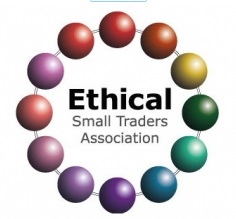ESTA seeks to be a model of best practice in how to run a successful, resilient, environmentally and socially responsible local business network.
As a condition of joining ESTA, members agree to make ongoing improvements in the way their business activities affect and contribute to environmental sustainability, community well-being and the ongoing personal well-being and ongoing personal self-development of everyone who comes into contact with the business or organisation. This is in addition to your businesses financial success, which we also want to support.
Rather than being additional business burdens; cultivating a positive relationship to the environment, society and the personal well-being of every individual, can greatly enhance the success of your business.
As a condition of joining ESTA, members agree to make ongoing improvements in the way their business activities affect and contribute to environmental sustainability, community well-being and the ongoing personal well-being and ongoing personal self-development of everyone who comes into contact with the business or organisation. This is in addition to your businesses financial success, which we also want to support.
Rather than being additional business burdens; cultivating a positive relationship to the environment, society and the personal well-being of every individual, can greatly enhance the success of your business.
Wishing to make a positive difference via what you do is the key entrance criteria for joining ESTA.
Prospective ESTA members agree to sign up to our Four-Fold Bottom Line ethos, and it is an ongoing reference point in everything we do. We wish to maximise and free the human potential of customers, members of the wider community and business owners and staff to apply their creative energy to the development of a healthy, prosperous and resilient local economy. Both for themselves and for others.
Members are encouraged to monitor and improve their performance with regard to the Four Bottom Line Framework on an ongoing basis.
As an organisation, ESTA is there to help you do that.
Prospective ESTA members agree to sign up to our Four-Fold Bottom Line ethos, and it is an ongoing reference point in everything we do. We wish to maximise and free the human potential of customers, members of the wider community and business owners and staff to apply their creative energy to the development of a healthy, prosperous and resilient local economy. Both for themselves and for others.
Members are encouraged to monitor and improve their performance with regard to the Four Bottom Line Framework on an ongoing basis.
As an organisation, ESTA is there to help you do that.
|
These are the Four Bottom Lines
|
Initially it is enough that Members are prepared to use these as a focus and ‘guiding star’.
If you are attracted to the prospect of joining us, it is very likely that you are already working with these to some extent.
If you are attracted to the prospect of joining us, it is very likely that you are already working with these to some extent.
Everyone is familiar with the phrase “looking after the bottom line”. It refers to the line in the balance sheet of a company which indicates the amount of profit that company is making. [1] We live in a society which is dominated by the maxim that, anything which does not directly increase this ‘bottom line’ is considered superfluous to the activities of a business. Another way of looking at this is to say, if there is no direct cost to a business of doing an activity which will increase the income of a company, and/or reduce its overheads, then this action should be done. Even if it means that there is an increased cost to someone else.
|
Where we want to get to And the way we get there are the same thing. The methods we use to get where we want determine where we end up. |
In 1994 John Elkington the founder of a British consultancy SustainAbility, first coined the phrase “the triple bottom line” [2] advocating the development of a “people account” and a “planet account” to accompany the finance-only account of any business activity.
In 2003 Yehuda Tagar, founder of the Persephone Institute, wrote a paper entitled “Humanising the workplace with the fourfold ‘bottom line’ “. [3] In which he added the businesses “impact on the personal and spiritual development of the individuals involved.” In other words, simply trying to develop a successful business which is as socially and environmentally responsible as possible is extremely difficult without accepting that the individuals involved in the business, whether managers, workers, suppliers, customers or members of the wider community all need to feel that the needs of their own personal development are being met as a result of engaging with the business. |
References
[1] http://www.investopedia.com/terms/b/bottomline.asp
[2] http://www.economist.com/node/14301663
[3] http://www.psychophonetics.com.au/attachments/2/Psychophonetics-collection-of-articles2009.pdf [page 85]
[4] http://www.johnelkington.com/TBL-elkington-chapter.pdf
Further Information
http://www.johnelkington.com/
[1] http://www.investopedia.com/terms/b/bottomline.asp
[2] http://www.economist.com/node/14301663
[3] http://www.psychophonetics.com.au/attachments/2/Psychophonetics-collection-of-articles2009.pdf [page 85]
[4] http://www.johnelkington.com/TBL-elkington-chapter.pdf
Further Information
http://www.johnelkington.com/




